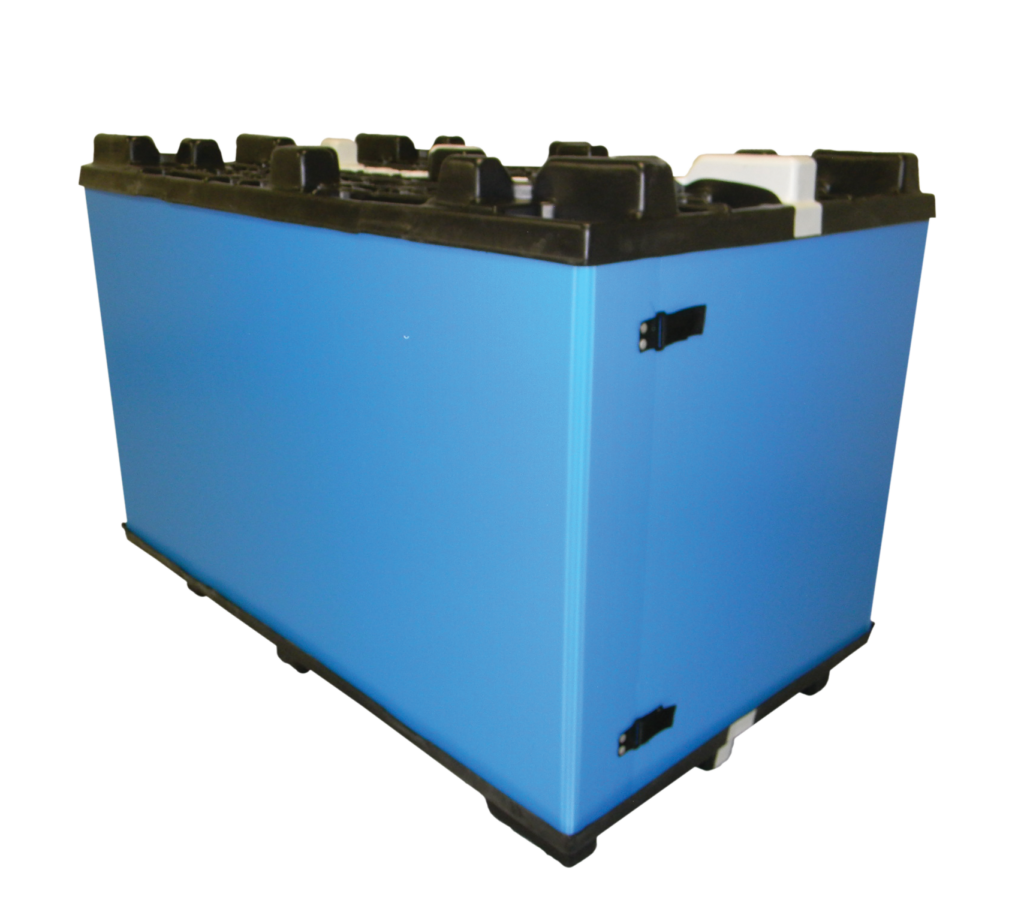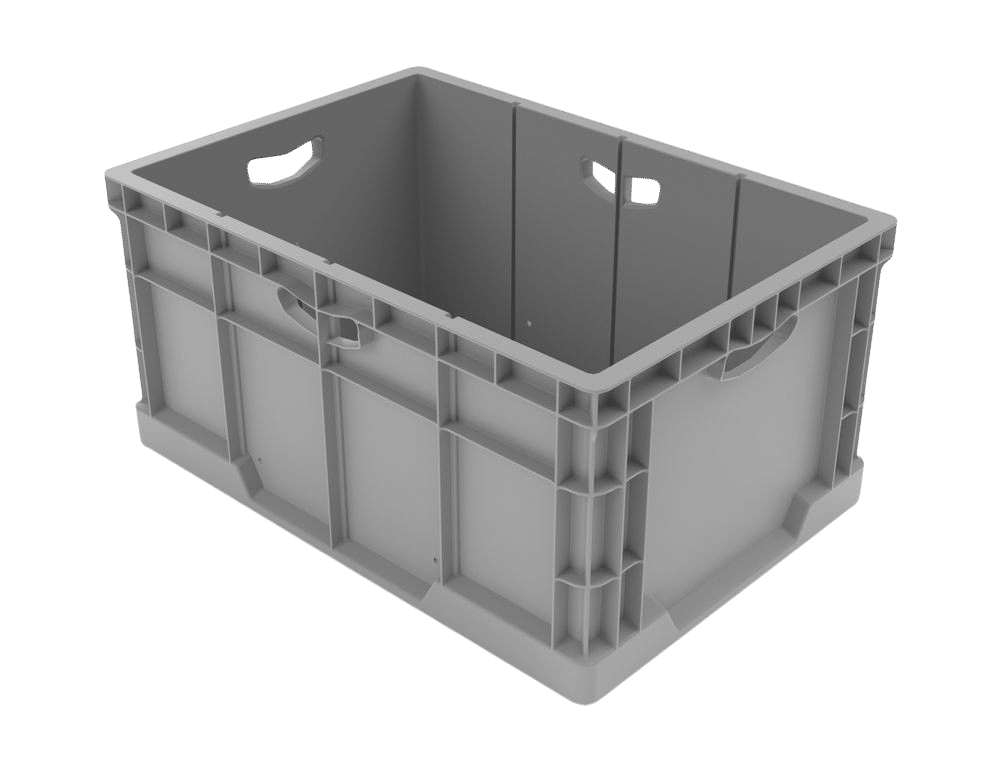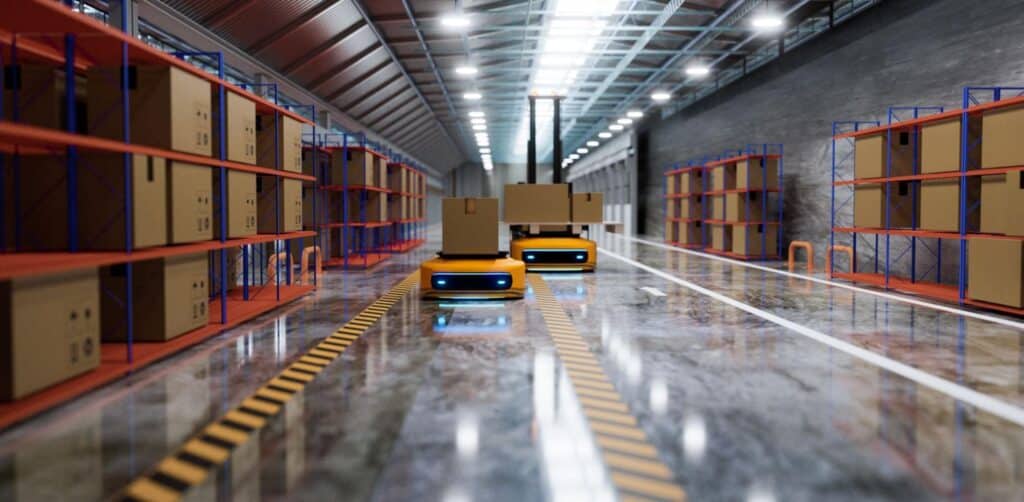The industrial logistics sector is undergoing a rapid evolution, spurred by advancements in Artificial Intelligence (AI) and the Internet of Things (IoT). These technologies, combined with smart packaging solutions, are redefining how goods are stored and transported by enabling everything from predictive maintenance and real-time tracking to enhanced cost transparency and error reduction.
This guide explores the significance of this AI-driven innovation and its transformative role in operational efficiency. For technical buyers, procurement managers, and operations executives, these insights offer actionable strategies to gain a competitive advantage in a tech-savvy marketplace.
The Core Challenge & The Tools for Transformation
For decades, industrial logistics has been defined by a set of persistent challenges: inefficiency, unpredictable costs, human error, and a lack of transparency. These issues lead to costly delays, damaged goods, and reduced customer satisfaction. Today, a powerful synergy of three key technologies is directly addressing these problems and transforming the industry.
Artificial Intelligence (AI): The Predictive Brain
At the core of this transformation is AI, which acts as the predictive brain of the modern supply chain. It simulates human intelligence to analyze vast datasets, identify patterns, and predict outcomes. This allows businesses to optimize routes, forecast maintenance needs, and make proactive decisions before disruptions occur.
The Internet of Things (IoT): The Digital Nervous System
If AI is the brain, the Internet of Things (IoT) is the digital nervous system connecting it to the real world. IoT creates a network of interconnected physical devices—such as vehicles, equipment, and warehouse machinery—each fitted with sensors that provide real-time data on their status, location, and performance.
Smart Packaging: The Active Data Source
A critical enabler that links the system together is smart packaging. Unlike a conventional container, smart packaging is an active participant in the supply chain, embedded with IoT sensors that provide immediate data on a shipment’s condition, including temperature, humidity, and shock. This crucial information is fed into AI models, turning a passive box into a vital, data-generating node that protects goods and ensures transparency from start to finish.
How This Synergy Revolutionizes the Supply Chain
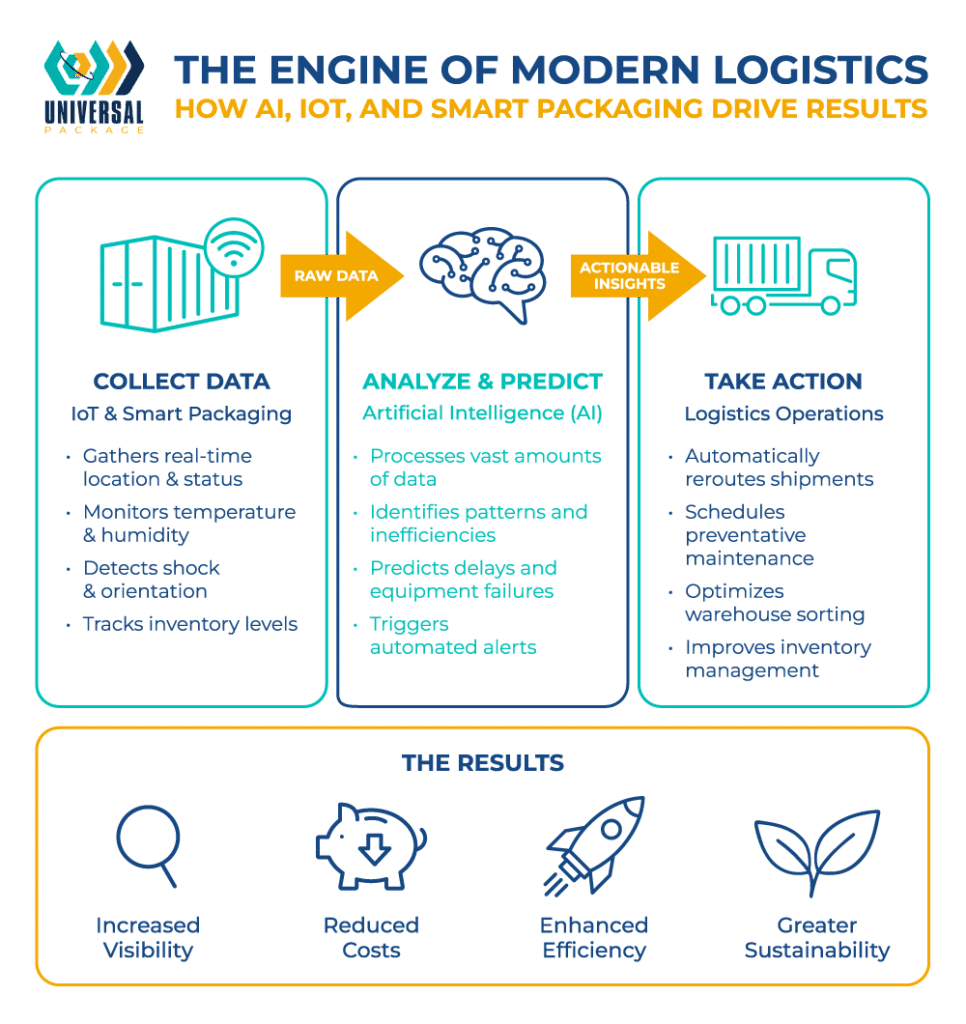
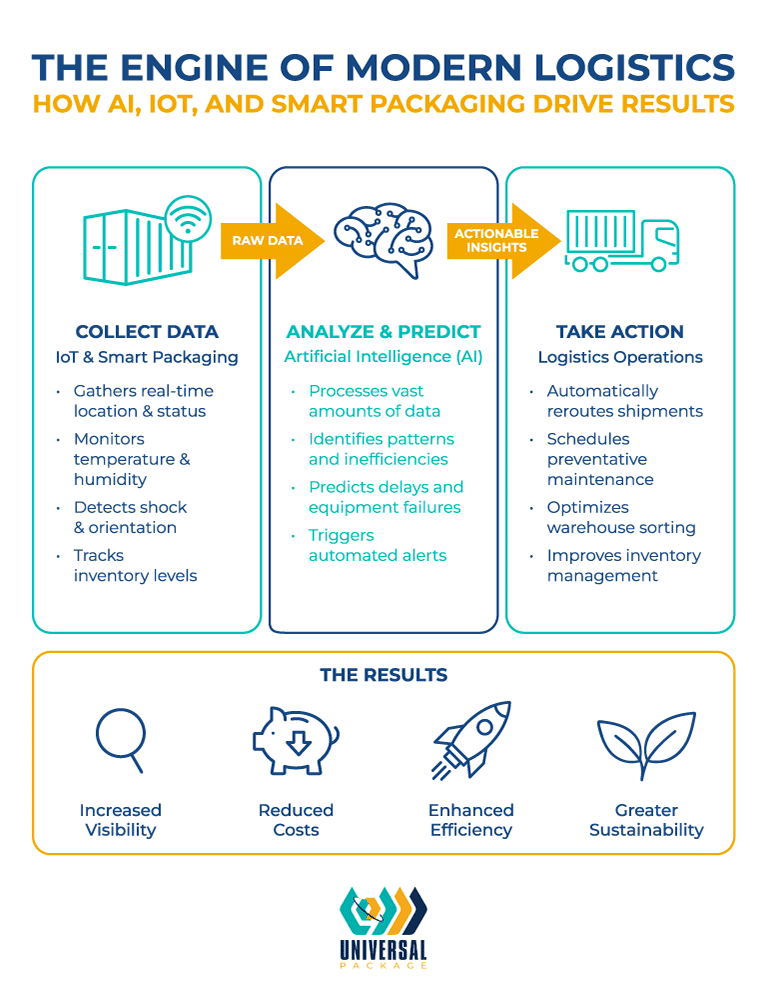
When AI, IoT, and smart packaging are integrated, they create a powerful synergistic effect that transforms every stage of the supply chain. This combination moves logistics from a reactive model to a proactive, predictive, and highly efficient operation, delivering key benefits in four critical areas.
1. Enhanced Visibility and Proactive Control
IoT sensors embedded in smart packaging provide a continuous stream of real-time data on a shipment’s precise location, temperature, humidity, and condition. AI algorithms process this information instantly to detect potential bottlenecks—such as traffic delays or adverse weather—and suggest alternative routes. This granular visibility allows logistics teams to respond to disruptions before they escalate, maintain just-in-time delivery models, and enhance customer satisfaction with accurate, reliable updates.
2. Boosted Efficiency and Error Reduction
In warehouses and distribution centers, AI-powered systems use data from RFID tags to automate sorting processes, directing packages with speed and accuracy that far exceeds manual capabilities. This automation extends to maintenance, where sensors on equipment and vehicles feed data to AI models that predict failures and schedule preventative upkeep, drastically reducing downtime. Furthermore, automated alerts from smart packaging notify teams of any deviations, such as temperature changes or mishandling, minimizing errors and allowing staff to focus on higher-value tasks.
3. Significant Cost Savings and Optimization
This intelligent ecosystem uncovers previously hidden costs. AI-driven analytics process IoT data to reveal inefficiencies like suboptimal routing, excessive fuel consumption, or underutilized assets. By identifying and correcting these issues, companies can streamline operations, consolidate deliveries, and reduce waste. This data-driven cost transparency empowers logistics planners to make better-informed decisions that directly improve profitability.
4. Improved Sustainability and Corporate Responsibility
The transformation extends to environmental goals. By using durable, reusable smart packaging, businesses significantly reduce waste from single-use materials. IoT tracking allows companies to monitor the condition and location of their reusable packaging assets, enabling predictive maintenance that extends their lifecycle. This not only delivers long-term cost savings but also supports corporate sustainability initiatives, creating a more responsible and circular supply chain.
Practical Applications Across Key Industries
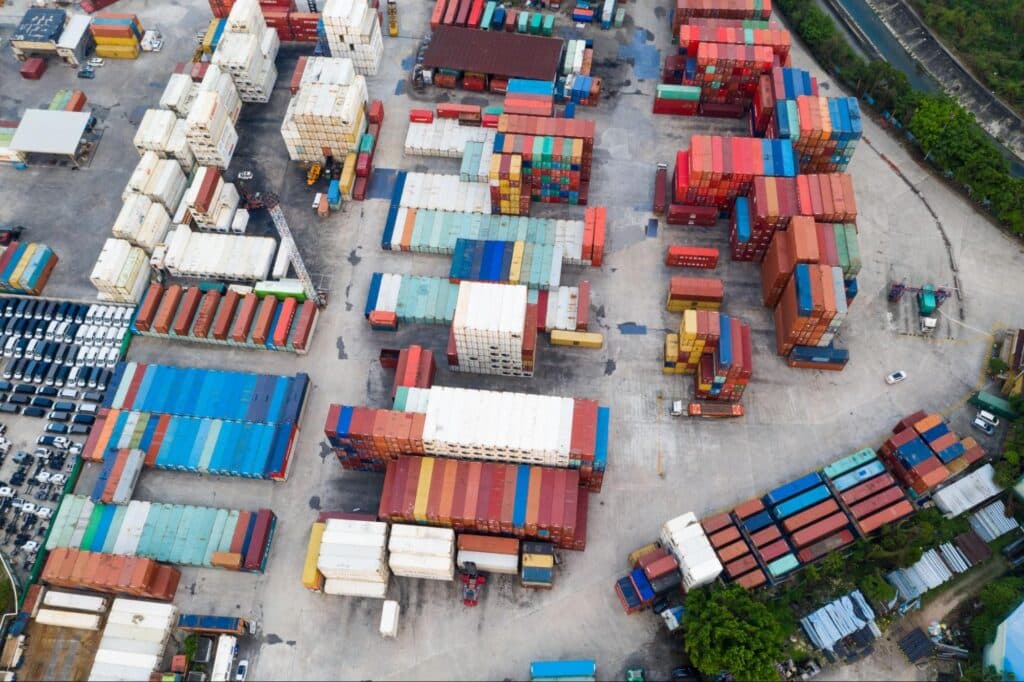
AI, IoT, and smart packaging are transforming logistics across various sectors:
Automotive Industry
In the automotive sector, just-in-time inventory management is critical. AI and IoT enable real-time tracking of components, allowing for timely rerouting in case of delays. Smart packaging using durable, reusable materials not only protects parts but also ensures they arrive in optimal condition, minimizing production downtime and aligning with streamlined Industry practices.
Medical and Pharmaceutical Sector
For pharmaceuticals and medical supplies, maintaining strict environmental control is essential. Smart packaging ensures drugs and medical devices remain effective during transit. Combined with AI, these systems support accurate demand forecasting and proactive inventory management, crucial for meeting surge demands in fast-changing markets.
Electronics Industry
Electronics require careful handling to avoid damage. IoT sensors in smart packaging detect shocks and static exposure, while AI optimizes inventory management for timely restocking. This integration helps maintain the quality of delicate components and reduces the need for buffer stocks by supporting efficient product rotation and delivery.
Implementing an AI-Driven Strategy: Key Considerations

Successful adoption of AI, IoT, and smart packaging requires a thoughtful strategy. Procurement teams should:
- Select adaptable and scalable solutions: Consider packaging designs that easily integrate with IoT sensors and AI analytics while withstanding repeated use.
- Ensure workforce readiness: Provide training to interpret sensor data and AI insights effectively.
- Focus on seamless integration: Confirm that new technologies mesh effectively with existing warehouse management or ERP systems.
- Balance initial costs with long-term ROI: Conduct thorough cost-benefit analyses to see how reductions in errors and maintenance offset procurement expenses.
- Anticipate challenges: Address cybersecurity and data standardization issues early through collaboration with reliable vendors.
Future Perspectives in AI and IoT Logistics
Looking ahead, AI and IoT will continue to drive innovation in logistics. Advances such as autonomous delivery vehicles, wearable IoT devices, and ever more sophisticated analytics tools promise to refine supply chain accuracy and responsiveness. As noted in Deloitte’s perspective on Industry 4.0, sustained evolution in smart technologies not only yields incremental improvements but also lays the groundwork for transformative shifts in logistics strategies across multiple industries.
Universal Package’s Innovative Packaging Solutions
Universal Package excels in delivering custom-designed packaging solutions that meet the modern demands of industrial logistics. By using high-quality materials like corrugated plastic, foam, and metal, they create durable, reusable packaging options that integrate seamlessly with AI and IoT technologies.
Custom Designs Built for Modern Logistics
Universal Package designs packaging with structural integrity and adaptability in mind, making each container suitable for protecting high-value or sensitive goods.
A Commitment to Sustainability and Cost Efficiency
Sustainability is a key focus for Universal Package. By promoting reusable packaging, they help businesses minimize waste and transition away from single-use materials. Their designs not only support environmental goals but also deliver long-term cost savings through extended product lifecycles.
The Revolution in Industrial Logistics: Embracing AI and IoT for the Future
The integration of AI, IoT, and smart packaging is revolutionizing industrial logistics by enhancing visibility, automating critical processes, and delivering significant cost savings while promoting sustainable initiatives. These considerations empower businesses to reduce errors, optimize operations, and adapt to an ever-evolving market landscape.
Universal Package offers innovative, custom-designed packaging solutions with a commitment to sustainability and operational excellence, making them an ideal partner for businesses seeking to future-proof their logistics operations. Contact Universal Package to discover how they can help your business harness these advanced solutions.


